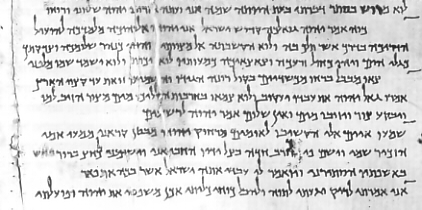| Summary of Goals In modern editions and translations of the Bible the text divisions that are found in ancient manuscripts are mostly ignored. Yet layout and punctuation are important to the interpretation of the Bible. The Pericope Group wants to make the data on unit delimitation in antiquity accessible to all Bible scholars and has created a platform to discuss methodical issues. |
Summary of Meetings Hitherto the Pericope Group has held nine international meetings in connection with congresses held in Utrecht, Rome, Berlin, Cambridge UK, Groningen, Edinburgh, Vienna, Amsterdam and Leipzig |
| Summary of Series The series Pericope comprises monographs and collaborative volumes on unit delimitation in antiquity, primarily in biblical manuscripts and lectionaries, but also in other texts relevant to biblical studies. Furthermore, the series incorporates exegetical studies which seek to demonstrate the impact of delimitation criticism on various branches of biblical scholarship. |
Summary of Data The original initiative to develop a collaborative database on unit delimitation failed because of lack of means. However, several scholars have put collections of relevant data at the disposal of the group and a fresh proposal for a comprehensive edition will be discussed at the Vienna meeting. |

Paragraphing in 1QIsa (125-100 BCE)
General information
Originally 'pericope' was a Greek word which could designate a section or a passage in a text (Liddell-Scott). Later on it was mainly used for larger paragraphs as read in the church. Up to the present day the special sign ¶ is a common marker of paragraphs in books. 'Pericope' (pronunciation pe-'ri-ke-pE, see below) is a loose association of Bible scholars and Orientalists interested in the way texts were subdivided in antiquity. Just as in modern texts understanding is furthered (and limited) by spaces, interpunction, paragraphing, ruling, blank lines, headings, ornaments, illustrations, colours, writing styles and marginal notes, so it was in antiquity, as is testified by numerous manuscripts and inscriptions, some of them dating from centuries BCE. The strange thing is that at present most Bible translators, exegetes and Orientalists ignore this kind of evidence. One seeks in vain for it in most modern scholarly editions and commentaries. Instead almost everybody divides the ancient texts in accordance with her/his own understanding. This eclectic approach has resulted in an appalling diversity of opinion with regard to the structure of these ancient texts which in turn influences the way they are understood in modern times.
Dissatisfied with this situation Marjo Korpel (Utrecht University) took the initiative to found the Pericope Group in 1999 as a sequel to her work with Johannes de Moor (Kampen) on the ancient manuscripts of Second Isaiah (Marjo C.A. Korpel, Johannes C. de Moor, The Structure of Classical Hebrew Poetry: Isaiah 40-55 (OTS, 41), Leiden: Brill, 1998). She invited Peter W. Flint (Langley, BC), Konrad D. Jenner (Leiden), Arie van der Kooij (Leiden), Johannes C. de Moor (Kampen), Josef M. Oesch (Innsbruck), John Olley (Perth) and Emanuel Tov (Jerusalem) to join her as editors of a new series provisionally called 'Unit Delimitation in Classical Hebrew'. During the first meeting of the Pericope Group in connection with the EABS Meeting in Utrecht in 2000 the board members attending the conference decided that a more comprehensive title would be needed. After consultation with the other members of the provisional board the following title for the series was approved: Pericope: Scripture as written and read in antiquity. The publishing house of Van Gorcum (Assen, The Netherlands) was granted the right to publish the series. In 2007 the publication was taken over by royal Brill (Leiden, The Netherlands). Since 2000 ten volumes have been published. The board was extended with specialists in various fields, notably in New Testament textual history. Korpel and Oesch organised the international meetings of the Group in Utrecht, Rome, Berlin, Cambridge UK and Groningen. The meetings in Edinburgh 2006 and Vienna 2007 were organised by Raymond de Hoop and Stanley Porter.